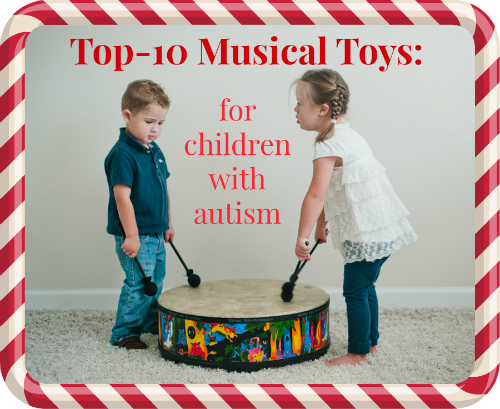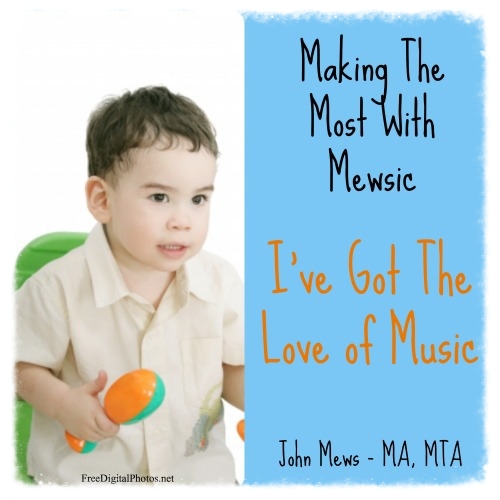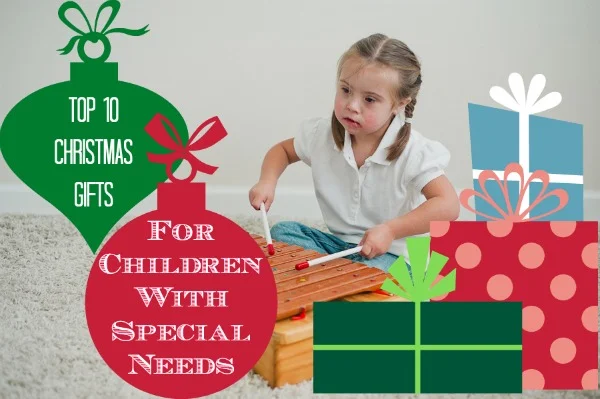
BLOGS
Educational blogs for parents and professionals
Top 10 Musical Toys For Children With Autism
This is the time year most people are out shopping for things to put under the Christmas tree. This can be an especially challenging time for parents of children with Autism. So many of the available toys are far too over-stimulating for these children
Over the years parents have asked about buying musical instruments for their child. I think these make great gifts, because they help the child engage in music making at home, which helps to reinforce what was learned during the music therapy session.
Here are my top ten musical instruments I recommend for children with Autism. For each one, I explain how the instrument can be utilized in a therapeutic and beneficial way. What a great dual purpose, a toy that’s also beneficial therapeutically! ( you can also click on each image or title for more information on the instrument).
1. Ukulele
The small size of the ukulele makes it great for small children and adolescents. It’s lightweight and narrow neck make it easy for the child to grasp. I find the Ukulele is useful for fine motor control when picking or strumming. You can also work on gross motor control if you rock the arm up and down to create strumming patterns. The Ukulele is also great for working on eye-hand coordination.
2. Recorder
Recorders are very popular with children and come in many colors. I often use this for language and speech development, primarily to aid in breath support and control. The recorder is also useful for working on fine motor skills that are needed to create different tones on the instrument.
I enjoy using the Sound Shapes®, because they are colorful, fun and come in different sizes, shapes and sounds. Sound Shapes® are easily stacked they don’t take up much room like most other stand-up drums and they are lightweight. The Sound Shapes® can provide therapeutic value in supporting eye-hand coordination, impulse control and to provide controlled sensory input.
4. Hand bells
Hand-bells come in various sizes and price ranges. I like these because they have a smaller scale (8 notes), are less expensive then others, and are quite durable. They are useful for developing fine motor skills, since you can simply press the top with your finger to make a sound. You can also use them to develop gross motor skills if you pick them up and ring them. I often use these to increase reading skills as well. I create color-coded music, which the child “reads” by playing the correctly colored bell. This also helps with visual tracking skills.
5. Cabassa
Cabassas come in various sizes. I prefer to use the larger ones, particularly if I want to use sensation and movement in my therapeutic approach. The weight of the cabassas can be useful for grounding a child, and you can roll the cabassa on the child’s arm, legs or back to create different sensations. A word of caution here – you should practice on yourself before using it on the child so that you know to use the right amount of pressure. The cabassa also can be useful for fine and gross motor skills, as well as visual and auditory stimulation when you roll it around and around.
6. Melodica
I often use the Melodica to support a child’s fine motor skills, breath control and eye-hand coordination. This is a less expensive option to purchasing a piano or keyboard.
7. Ocean Drum
Of all the drums I use in my practice, the Ocean Drum is by far the most popular. This drum comes is different sizes and colors. I prefer the ocean drum with fish inside, since it provides added visual stimulation. This instrument can be used to aid with relaxation, grounding, sensory-input, gross motor and impulse control. The sound of the ocean drum ranges from a loud crescendo of crashing waves to the gentle white noise of the sea foam bubbles dissipating on the warm sand.
8. Castanets
Castanets are fun, small and the least expensive instrument that most children love to play, mainly because they are touch-responsive. I have used this instrument to help children slow down from a fast paced-rhythm to a slower more regulated rhythm. This can be used as an auditory cue for children to understand their current energy levels and how they can learn to self-regulate. This instrument is also useful for developing fine motor skills, particularly for differentiating between using and isolating different finger movements.
I recommend buying a less expensive keyboard for therapeutic use. Children particularly seem to enjoy keyboards whose keys that light up as they are played. I use keyboards to help with fine motor skills, as an outlet to help children be creative and have fun on their own without direct instruction. Make sure your keyboard has a record button so your child can record their creative masterpieces and play it back. This helps them to feel good about their accomplishments, and allows them to share their work with others. This is particularly useful to enhance social skills and to promote sharing.
Like most of the instruments listed here, xylophones come in various sizes, colors and prices. For use at home I suggested something smaller, more colorful and less expensive. I prefer the wooden xylophones since they produce a lower-pitched sound, which helps to prevent over-stimulating a sensitive child’s auditory system. The xylophone can also help with a child’s eye-hand coordination, impulse control, gross motor skills as well as reading skills if you use color-coded music to match the notes on the xylophone.
I hope you find these list of instruments helpful in bringing some of the therapeutic benefits of music into your home. Please feel free to reach out to me if you have any questions about the appropriateness of a particular instrument for your child. If you are not working with a music therapist already, in most cases I can refer you to a qualified therapist in your area that can support your child’s development through music therapy.
This article has also been featured in this December issue of Autism Parenting Magazine.
Happy Holidays everyone!
Give the Gift of Music This Holiday Season!
Musically,
John Mews, BMT, MA, MFTI
john@mewsicmoves.com
www.mewsicmoves.com
Let's be social:
Please share, pin, like and leave your comments below as I love to hear from you!
Top 10 Christmas Gifts For Children With Special Needs
At this time of year, parents often ask for Christmas gift suggestions for their child with special needs. For these parents, it can be quite challenging to find the right gift - a gift that is fun, not over-stimulating, and has some therapeutic value.
So in time for the holidays season, I have created a top-10 list of my current favorites. I have also included its potential therapeutic value under each link so you can see which gift would be best suited for your child. (Click on each item to view its description)
1. Sounds Shapes
- Gross motor skills
- Impulse control
- Sensory input
2. Cabasa
- Fine motor skills
- Stimulation and sensory needs
3. Ocean Drum
- Relaxation
- Sensory needs
- Impulse control
4. Melodica
- Fine motor skills
- Oral and breath control
- Eye-hand coordination
5. Ukulele
- Fine motor skills
- Eye-hand coordination
- Gross motor skills
6. Kazoo
- Oral motor skills
- Breath control
7. Legos
- Fine motor skills
- Joint attention skills
- Task focus
- Sharing
- Turn-taking skills
- Problem-solving skills
8. Eggspressions
- Social skills
- Emotional awareness
- Emotional Development
9. Trampoline
- Sensory input/needs
- Gross motor skills
- Balance/coordination skills
10. Dizzy Disc
- Sensory input/needs
- Gross motor skills
- Balance/coordination skills
I hope you discovered something new and useful from this list. If you have any toys that you would like to add to this list, please add it in the comment section below.
Happy Holidays!
John Mews, MA, MTA
For FREE songs, videos and tips on how to support children with music click here.
























